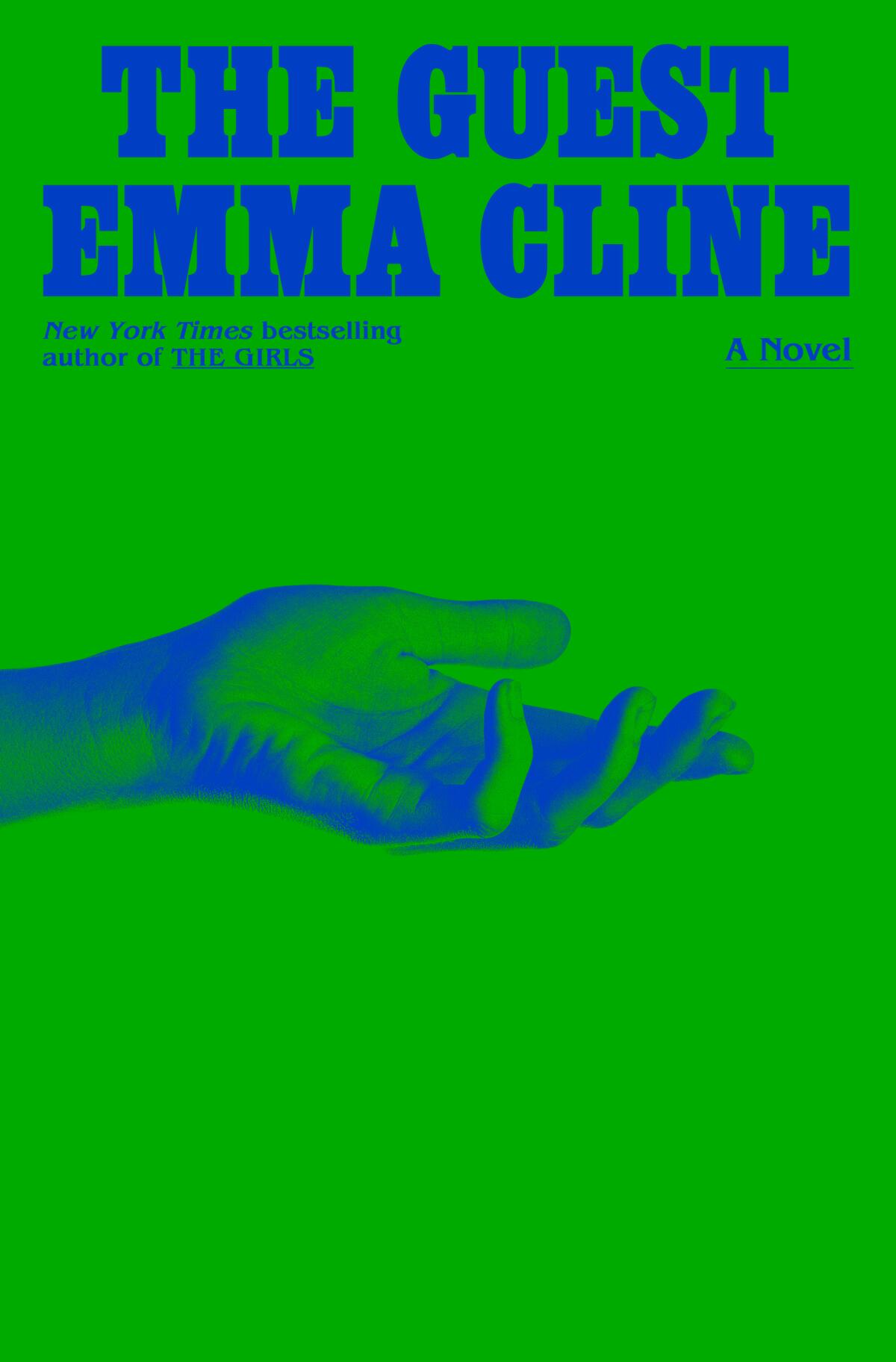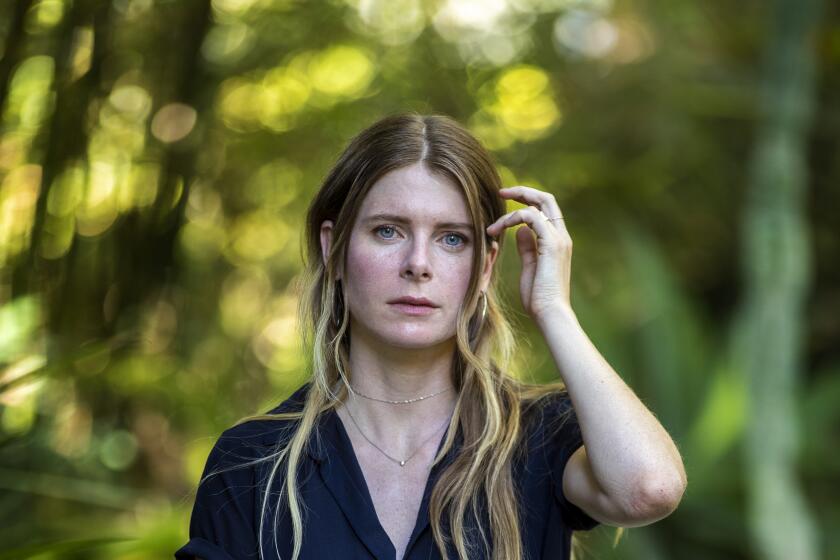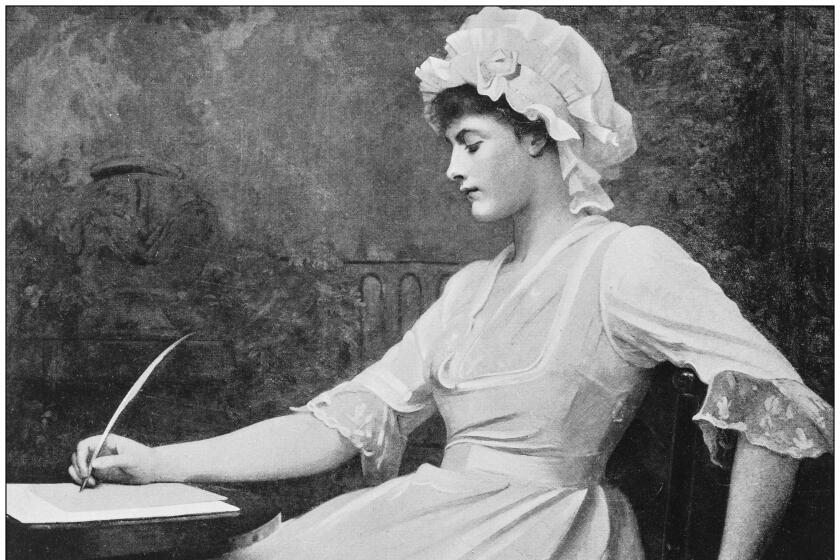‘The Girls’ novelist Emma Cline takes on the millennial grifter tale

- Share via
Review
The Guest
By Emma Clline
Random House: 304 pages, $28
If you buy books linked on our site, The Times may earn a commission from Bookshop.org, whose fees support independent bookstores.
They say not to use high beams in fog. The water vapor refracts the intense glare of headlights back toward the driver in a way that actually decreases visibility. Best, then, to use low light. This is the vibe of a story by Emma Cline, who writes so luminously about the haziness of female desire that even the most revelatory moments unfold in a sort of soft focus. She writes so sharply about the uncertain contours of women’s wanting that the effect is one of compelling, almost pleasurable edgelessness.
Cline’s acclaimed first novel, “The Girls,” is a loose retelling of the Manson murders centered on the young women who get swept up in the treacherous orbit of a charismatic lecher. She followed that up with “Daddy,” a collection of stories; in one of them, an American Apparel employee starts a side hustle selling her worn underwear to men she meets online; in another, two women at a rehab center become infatuated with a male celebrity who checks in.
Her new novel, “The Guest,” proves Cline has become adept at portraying the eager heat of lust — not necessarily for sex, but for power and comfort — with cool insouciance. The narrative follows Alex, a 20-something sex worker who is staying for the summer with Simon, a wealthy art dealer in his 50s, at his vacation house on Long Island. Simon does not know about Alex’s profession. He also does not know that Alex is totally broke: Her roommates have evicted her from their Manhattan apartment due to nonpayment of rent, and most of her recurring johns have moved on. With no other prospects, she travels with Simon “out east.” “She had disappeared herself,” Cline writes, “it had been easy.”
Cline’s new collection of short stories, her followup to “The Girls,” features women performing their sexuality and older men in cancellation limbo.
The word “easy” is repeated often in the first chapters of what becomes a quixotic new entry in the millennial grifter canon. “It had been easy to slot herself into Simon’s life here,” Alex thinks, “its textures and habits were so finely woven that Alex had only to submit.” When Alex dings Simon’s expensive car, she worries he’ll notice — if not the ding, then at least Alex’s guilt over it. Her simple solution is to become intimate with Simon: “How easily these things went.”
Alex attends a party thrown by one of Simon’s rich friends, a woman named Helen. The most interesting thing about Helen is that she has a much younger second husband, Victor, and it is Victor whom Alex sets her sights on. It’s not so much romantic as it is a recognition of some shared impostor syndrome. Victor shows Alex Helen’s pool before throwing her into it and following her in. Simon finds them, and soon he sends Alex packing back to the vacancy of her life in Manhattan.

At the train station, however, Alex hatches a plan. She decides to bide her time, drifting among the summer houses through some combination of hitchhiking, squatting, party-crashing and seduction until Simon’s end-of-summer bash, when they’ll both laugh it all off and Alex can be subsumed back into his life of ease. This is the inciting incident that gives the novel its plot, its clock, its stakes. For the rest of the run time, Alex schemes her way into the cars and pools and homes — and lives — of a series of unsuspecting vacationers. It’s a whole lot of fun, even if the people in the book barely have any.
If it all sounds a bit Cheever-y, that’s seemingly by design. The fact that swimming appears to be the only thing that gives Alex joy may well be a callback to John Cheever’s landmark 1964 short story, “The Swimmer,” in which a middle-aged man traverses an upscale suburb by paddling across its denizens’ pools. “Being embraced and sustained by the light-green water,” Cheever writes, “seemed not as much a pleasure as the resumption of a natural condition.”
That could serve as an apt description of how “The Guest’s” protagonist moves and feels about the world. As with many of Cline’s heroines, Alex’s desires are at once basic and vaporous.
“I was a daisy-fresh girl and look what you’ve done to me.” ― Vladimir Nabokov, Lolita “The Girls” is gorgeous, disquieting, and really, really good.
Is it possible for a novel to be heavily erotic without being at all sexy? A lot of seduction occurs throughout the book, but hardly any of it pulses with real pleasure. At one point, Alex gets herself invited to a party thrown by young people sharing a house; she flirts with a guy and they eventually hook up, and Cline describes it so: “Her body was involved, her brain forced to recognize what was happening. A flush radiated through her — then what? Then nothing.”
Then what? Then more mostly empty houses and mostly empty kisses. The closest Alex comes to directly expressing sensuality is when she looks at a famous painting hanging on someone’s wall; it’s not a print or a facsimile but the original: “It’s like I’m getting a high off this,” she says. “Like, just purely off the estimated value.”
Perhaps unsurprisingly, she comes most alive when confronted by others’ wealth, and it’s in these moments that the novel comes most alive as well. Early in the book, Cline describes a rich man as being “tanned to the color of expensive luggage.” Alex watches someone else’s groundskeeper mow the lawn and thinks, “So much effort and noise required to cultivate this landscape, a landscape meant to invoke peace and quiet. The appearance of calm demanded an endless campaign of violent intervention.”
Novelist Lynn Steger Strong on the revolutionary passivity of Rachel Cusk, Ottessa Moshfegh and Sally Rooney — how we’ve misread them and what comes next.
Alex is so attuned to the “textures and habits” of the elite, so sure she can pull one over on them that she of course hoodwinks herself. In “The Girls” Cline writes, with a mix of resignation and defiance, that the trick young women can perform is to “smile from the corner they’d backed you into. Implicate yourself in the joke even if the joke was always on you.” Her follow-up novel expands on this; is it possible, Cline asks, to be both the joker and the butt of the joke, the driver and the passenger, the owner and the guest, all at once?
Atmospheric and at times incandescent, “The Guest” is a story about the ways people turn themselves into ghosts in order to become more seen. As a narrative and a reading experience, it’s about how low lights are often the only way through the fog.
Hart’s first novel, “We Do What We Do in the Dark,” was released in 2022.
More to Read
Sign up for our Book Club newsletter
Get the latest news, events and more from the Los Angeles Times Book Club, and help us get L.A. reading and talking.
You may occasionally receive promotional content from the Los Angeles Times.












